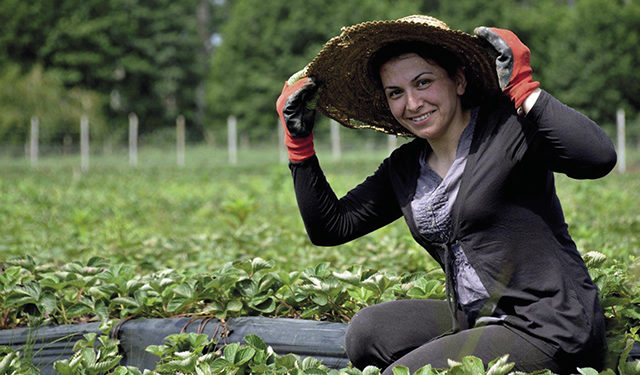Rural SMEs in Georgia are at the early stage of development. Poorly competitive, they account for only 16% of the national SME output. Rural SME development is constrained by weak business and marketing skills, poor market access and unequal access to finance, often caused by absence of collateral and low financial literacy. These gaps cannot be mitigated due to low development and accessibility to business support services. The resulting undercapitalization, and limited access to knowledge and innovations, hamper job creation in rural areas. Underemployment and inefficiency translate into low incomes, a higher level of poverty (27.5% rural vs 17.1% urban) and youth migration, leading to increased reliance on subsistence farming, remittances and social allowances from the government. The need for inclusive access to finance is particularly apparent with regards to women and youth led SMEs, especially amongst ethnic minorities, which face more shortage of information due to language barriers. Women entrepreneurs lack access to both resources and information.
Covid-19 further compounded the existing problems. The containment measures caused the tourism sector to grind to a halt. Uncertainty also led to a drop in foreign capital flows and economic activity, as well as to the currency depreciation, which triggered inflation. Georgia responded with a set of anti-crisis measures, including social transfers to vulnerable groups, tax concessions, interest rate subsidies, micro grants, and credit guarantee schemes. Yet, SMEs still experienced a major decline in sales (-67% in 2020).
Switzerland has been supporting economic development in rural areas for many years already, with projects supporting agriculture value-chains. By launching a new initiative to support rural SMEs development, the Swiss Cooperation intends to further focus on priorities of the Government of Georgia, responding to the SME Development Strategy 2021-2025, to the pandemic anti-crisis economic recovery plan, as well as to the Agriculture and Rural Development Strategy of Georgia 2021-2027. These documents define improved access to finance, diversification, innovations, skills and entrepreneurial culture as strategic priorities in Georgia.

“Rural SMEs have an important role to play in the economy of Georgia, but their access to finance and to the knowledge needed for growth and competitiveness is limited,” says Danielle Meuwly, Regional Director of Cooperation, Embassy of Switzerland. “The new project supported by the Swiss cooperation aims at building up the capacities of business associations and of providers of business services so that needs of rural SMEs are met. This will foster job creation and income increase for rural inhabitants. Enabling rural SMEs’ access to finance is one of the priorities of the new four-year Regional Cooperation Program for the South Caucasus 2022-2025 that we will launch next year.”
The overall goal of the project is to increase income and employment for rural women and men.
This is to be achieved by improving the capacities of national agencies, local business support service (BSS) providers and business associations to offer more effective services to rural SMEs to enhance financial literacy and management skills. These will translate into more resilient and growing SMEs, and the creation of additional jobs and income opportunities for rural women and men. Ultimate beneficiaries of the project will be 1500 rural SMEs (of which 450 are owned by women, 75 owned by ethnic minorities, and 500 small-holder farmers), each of whom will benefit from improved advisory, financial services and technical and operational practices, and raised awareness of financial/investment opportunities. In total, 12,600 rural women and men will benefit from increased or more stable incomes.
“Switzerland has taken a long-term view in investing in an initiative that develops the system for future rural business growth,” notes Richard Rose, Team Leader, Rural SMEs Development Project. “The Consortium of Swisscontact, Mercy Corps Europe, and the Springfield Center for Business in Development has come up with a four-year project which is aligned with Switzerland’s International Cooperation Program for the South Caucasus (2022-2025), aiming towards rural business diversification, resilience, income, and job creation. The Rural SMEs Development Project provides a platform for identifying and promoting market opportunities that increase the uptake of financial and business services by businesses in rural areas, especially by vulnerable groups. This benefits both commercial service providers and entrepreneurs, and contributes to development outcomes for rural women and men in Georgia.”

The focus of the project will be on improving the operations of rural businesses through access to finance and business support services (BSS). The project will strenghten market players (business associations, consultancies and government agencies- to provide quality advisory services to SMEs, improving their financial and management skills. Consequently, advanced SMEs will develop more successful grant and loan applications, and will improve their access to finance needed for growth, thus increasing job and income opportunities for rural women and men. The project will focus on rural SMEs in three sectors identified as the most relevant entry points for growth opportunities: 1) Manufacturing – beverage, food, non-metallic materials; 2) Agriculture – livestock for meat and dairy; and 3) Tourism – including rural guesthouses and gastronomy. To enhance the relevance and quality of BSS, the major intervention lines will mostly work on: 1) Improving financial management knowledge and skills; 2) Promoting investments in and absorption of innovations (machinery/technology); 3) Facilitating market access, and 4) Developing marketing skills.
The project will be implemented in close partnership with the private sector. The main target groups, i.e. business support services, business associations and rural SMEs, are private sector actors. The project will substantially enhance the capacities of these groups and will sustainably increase their effectiveness and responsiveness to market opportunities. Commercial banks will also be actively engaged in making their financial products better adjusted to the needs of rural SMEs, as well as in communicating their funding requirements to the potential borrowers.
The project will closely work with the EIB partner banks which intend to expand lending to SMEs. BSS providers and SMEs will be assisted to better understand the decision making priorities of banks, which will facilitate the development of more bankable business proposals and thus increase banks’ effective outreach to rural SMEs.
Special attention will be given to the upskilling of female owners and employees of RSMEs, ensuring access to information for ethnic minority groups through multi-language platforms and events. The project will facilitate the embedment of the “leave no-one behind” agenda in services of sectoral associations (tourism, agriculture), BSS providers, banks and government agencies, to better orient their operations towards vulnerable groups in terms of gender, language proficiency and age. The target sectors are vulnerable to environment and climate change aspects and the capacities of market actors will be strengthened to adapt to the changing environment and to improve environmental practices.
By Team GT














